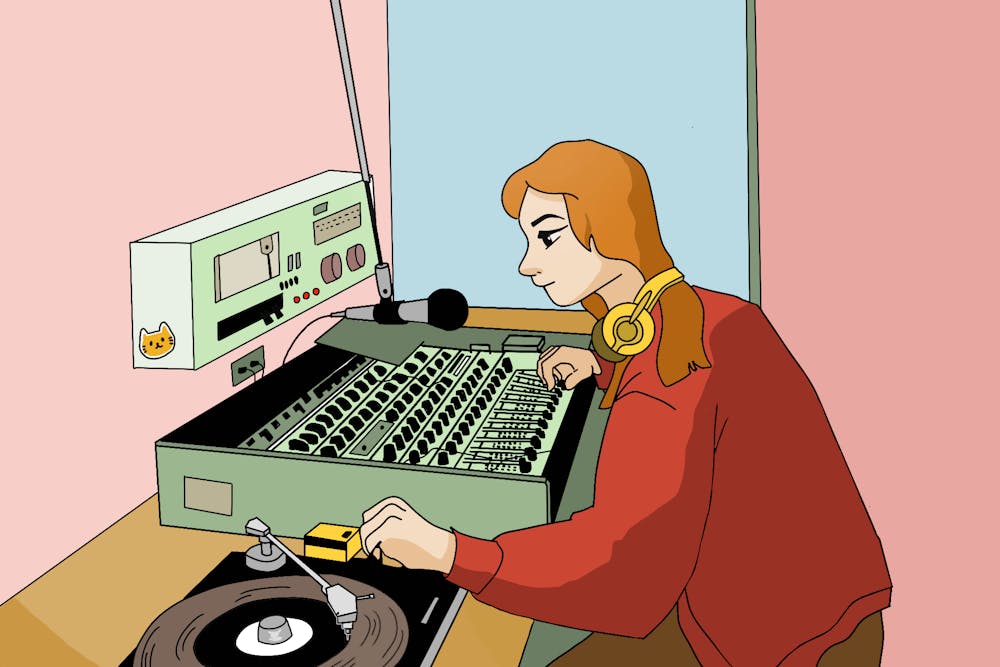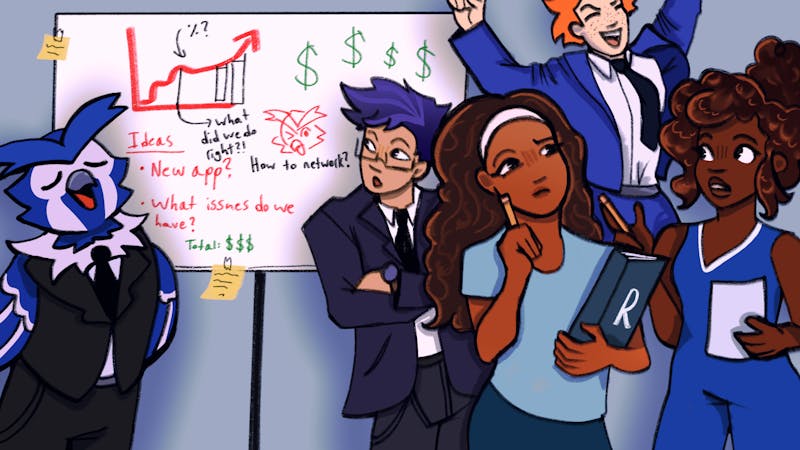In the booth with KTRU student DJs

Genesis Hahn / Thresher
Whether a 24/7 listener or just a fan of the stickers, you’re probably familiar with KTRU, Rice’s student-run radio station. In addition to general broadcasts that play a mix of music, KTRU hosts a wide array of specialty shows devoted to specific genres and musical themes. The Thresher talked to the Rice student DJs behind some of the KTRU shows — both decades-old and brand new — that you can tune into this semester.
Babewaves
Babewaves, which airs Wednesdays from 10 to 11 p.m., has a multi-year history. According to DJ Imogen Brown, the goal of Babewaves is to highlight music by woman, femme and non-binary artists. Brown, a Duncan College sophomore, said she tends towards punk and alternative music in her Babewaves playlist. She describes her love of “angry female voices” as a form of catharsis.
“Women have it tough,”Brown said. “Women have it so tough, and it’s so important to get angry about it and it’s so important to advocate for yourself and for other women.”
For Brown, DJing for Babewaves provides an opportunity to expand her understanding of the genre that means so much to her.
“Something that I’ve taken from [hosting Babewaves] is a more diverse knowledge of music,” Brown said. “If you had asked me to [DJ] two years ago, I probably would have only played the same white-girl punk bands over and over and over again.”
Brown said her desire to center diversity in her Babewaves selections applies both to the artists’ identities and to their levels of mainstream recognition.
“I’m very intentional about the background of each artist and about the type of music I’m introducing people to,” Brown said. “I feel like being given the opportunity to showcase music on KTRU gives me an obligation to also [feature] smaller artists or people with less than 100,000 listeners on Spotify.”
Löded Diper
Löded Diper, which draws its name from the “Diary of a Wimpy Kid” book series, airs on Fridays from 4 to 5 p.m. and focuses on punk and garage rock. Tania Garcia-Jasso, one of the Löded Diper DJs, characterizes garage rock by its emotional intensity and unpolished feel.
“Any time I hear young artists or voices with backing tracks that are fuzzy and gritty and angsty, that’s usually a pretty good song,” Garcia-Jasso, a Sid Richardson College sophomore, said. “Garage rock denotes that aspect of homemade-ish or ‘from the community towards the community,’ which I especially like and KTRU really likes, because we’re kind of all about that.”
Garcia-Jasso said she takes Löded Diper as an opportunity to broaden listeners’ perspectives on what a garage rock musician looks like.
“We also like to showcase any artists that may not get as much attention as other artists within the garage rock genre,” Garcia-Jasso said. “So, not always young people and not always, say, white guys in rock t-shirts.”
For Garcia-Jasso, broadcasting garage rock’s angst to the world provides both catharsis and community.
“Here at Rice and in the professional world, sometimes you’re discouraged from acting like a teenager or letting emotions out … It’s cool to be able to share that music and those emotions,” Garcia-Jasso said. “Sometimes it’s just really nice to play something especially cathartic and angsty and tween-y and just be like, ‘Wow, yeah, I feel like I wasn’t the only one that needed that.’”
Salad Show
Salad Show is a new show this semester airing on Mondays from 9 to 10 p.m. and hosted by Amy Lam, a Lovett College sophomore. Lam said the show aims to highlight instrumental music, a category she describes as ranging from classical to electronic music to jazz, as well as experimental variations within those genres. According to Lam, this wide variety of musical textures is what inspired the name "Salad Show."
"Some people think of instrumental music and they don't realize that it's as broad as music with words," Lam said. "The purpose of the show is to make listeners think about instrumental music differently. Not just as something that's a backing part to vocal music, but as something that stands as music on its own and has a lot of nuance and interest and potential within itself as a medium."
Lam said she became a KTRU DJ at the beginning of her freshman year, starting off with a general show before deciding to host her own specialty show. In making that transition and launching Salad Show, Lam said she has felt encouraged and supported by the KTRU community.
"I feel like KTRU is very supportive of students [who] want to do new things," Lam said. "[KTRU is] an environment where if you're excited about a certain kind of music, you can just share it."
Genetic Memory
Nathan Bergrin, a Wiess College senior, is a DJ for Genetic Memory. The show airs from 10 p.m. to 1 a.m. on Monday nights and is one of KTRU's longest-running specialty shows. According to Bergrin, Genetic Memory originated in the 90s as a showcase of the Houston noise music scene. Since then, it has evolved into a catch-all for KTRU's more experimental music.
"[Genetic Memory] is where we put a lot of the music that's a little too weird or a little too hard to transition into from all the other sets," Bergrin said. "Anything goes, which is what I like about it … you have a lot of freedom with it."
For Bergrin, the music’s context is just as important as the sound itself.
"I try to read up a lot on the things that I play, which not everyone does," Bergrin said. "I like to talk for three or four minutes about [songs] and give a lot of background. But, again, I don't want to hear just myself talk. I want to hear other people who are passionate about [music]."
Bergrin said that he is Genetic Memory's only student DJ – the three others are from the Houston community. For him, the opportunity to interact with people beyond the hedges is one of KTRU's strengths as a campus organization.
"Something I really like about KTRU is that it is one of the few organizations that actually has significant student-community overlap," Bergrin said. "[KTRU] brings people together, both on campus and off."
Chore Chart
Chore Chart is a new show this semester, broadcasting on Thursdays from 7 to 9 a.m. DJ Marlena Fleck, a fifth-year student from Martel College, describes the show as ambient-focused.
"[Ambient music] is very slow music, very intentional music and minimal music," Fleck said. "It's usually meant to relax the listener or to slow down their thought process a little bit, to reflect."
According to Fleck, this will be the first ambient show KTRU has had in a long time. In preparing for her new show, Fleck used her understanding of ambient music to decide on a name.
"I wanted [a show name] that was not explicitly 'ambient music' or 'instrumental,'" Fleck said. "[Chore Chart] notes the repetitive qualities that are usually in ambient music and instrumental music. I liked Chore Chart as a way to talk about reflecting or resetting and [to talk about] cleanliness and organization as another way to do that."
Like Bergrin, Fleck praised the Rice-Houston connections KTRU facilitates.
"[KTRU is] a really awesome way to connect with the community," Fleck said. "There's a really strong presence [at KTRU] of community DJs who want to get to know the student DJs and want KTRU and Houston to have an amicable relationship."
More from The Rice Thresher


Sree’s Tiffin feeds a community of cravings
Of all the common sicknesses Rice undergraduate students face, none is more widespread than homesickness. Trisha Rangi said she understands what it’s like to miss things that feel like home, and she decided to do something about it.

New student center to ‘complete’ central quad
Breezeways, arches and outdoor seating will abound at the Moody Center Complex for Student Life set to break ground May 8. The 75,000-square-foot complex was designed by architecture firm Olson Kundig and has an expected completion date of fall 2027.

Please note All comments are eligible for publication by The Rice Thresher.